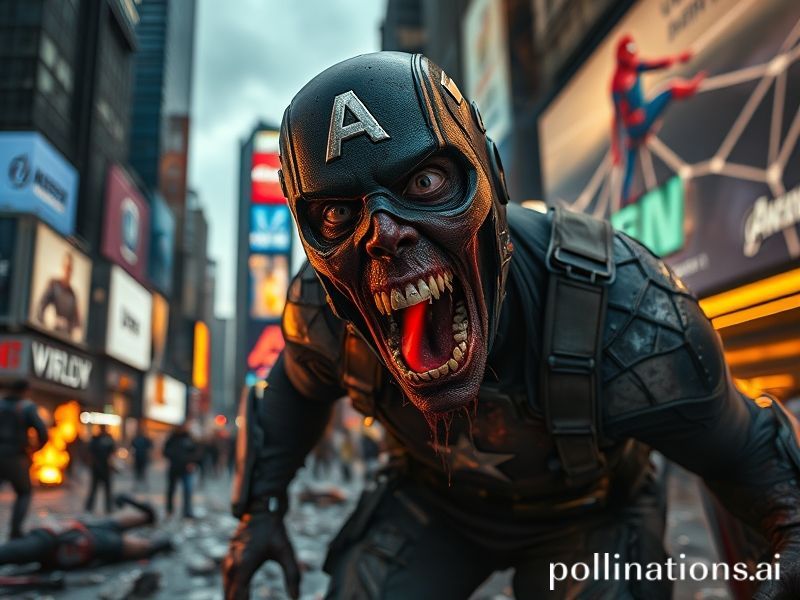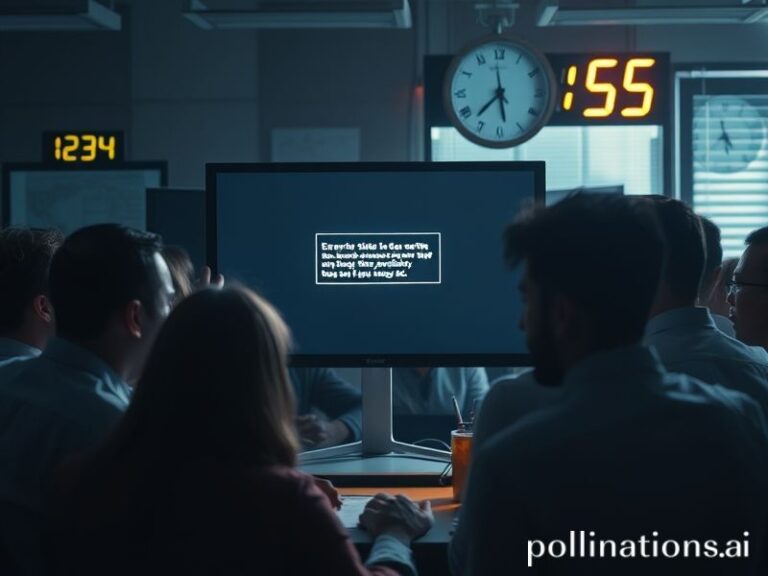World Infected: How Marvel Zombies Became the Planet’s Favorite Apocalypse
GENEVA—The World Health Organization’s emergency session this week was supposed to tackle boringly terrestrial viruses, but delegates spent most of the coffee breaks asking one another the same question: if Earth’s mightiest superheroes can be zombified, what chance does the average taxpayer have? The release of the streaming series “Marvel Zombies” has triggered the kind of global chatter normally reserved for collapsing currencies or Olympic bribery scandals. From Lagos minibuses to Seoul subway cars, commuters are binge-watching alternate-universe Avengers devour civilians faster than you can say “structural-adjustment program.” It’s horror, it’s satire, it’s brand extension—essentially the holy trinity of late-capitalist entertainment—delivered with the subtlety of a Hulk smash.
Naturally, the United Nations has opinions. “A zombie Captain America undermines seventy-five years of U.S. soft-power propaganda,” complained one European diplomat between puffs of an unfiltered cigarette that will probably kill him slower than any undead shield-throw. Meanwhile, China’s state censors quietly let the episodes circulate, presumably delighted to let citizens glimpse American icons literally eating their own populace. Russia’s RT network ran a panel titled “Superhero Decadence,” arguing that Marvel’s flesh-eating Avengers reflect the inevitable collapse of Western moral fiber—an analysis undercut slightly when the host’s own mic flag fell apart mid-broadcast, revealing a hidden Disney+ subscription barcode.
Viewed from the global south, the metaphor is less metaphorical. In Haiti—where folklore invented the zombie as a metaphor for colonial sugar-plantation slavery—students chuckled at the idea that now even billionaire technocrats in flying armor can be reanimated to shamble mindlessly. “Welcome to the club, Stark,” one Port-au-Prince graffiti reads beside a stencil of Iron Man missing half his face. Across the border in the Dominican Republic, vendors sell bootleg T-shirts of zombie Thor eating the European Central Bank, a shirt so popular it briefly outpaced inflation itself. If nothing else, the series has accomplished what the IMF never could: uniting the Caribbean in uproarious, if slightly nervous, laughter.
Economists, those professional killjoys, estimate the Marvel Zombies franchise will generate $2.3 billion in merchandising before the next inevitable reboot. That figure roughly equals Moldova’s GDP, prompting Chişinău wags to suggest they replace their national currency with limited-edition zombie Black Widow action figures. The European Central Bank, always game for avant-garde monetary experiments, is reportedly “monitoring the situation,” no doubt imagining a future quantitative-easing program backed by plastic superhero limbs. In a world where crypto empires rise and fall faster than you can say “Dogecoin,” undead Avengers may be the most stable asset class left.
Yet beneath the gore-spattered merch lies a genuinely global anxiety. South Korean lawmakers held a late-night session after constituents flooded switchboards: if super-soldiers can be infected, how secure are our own biotech labs? Israel’s military censors yanked a promotional poster showing zombie Hawkeye leveling Jerusalem, ostensibly to avoid panic but mostly, insiders say, because the image looked uncomfortably similar to routine Thursday. Even neutral Switzerland updated its famously detailed civil-defense pamphlet, adding a page titled “In Case of Super-Powered Undead.” The recommended survival kit: canned food, bottled water, and—this being Switzerland—a wristwatch accurate enough to schedule your own brain-eating down to the millisecond.
Of course, the joke ends where real pandemics begin. Viewership spiked 34 percent during the latest COVID wave, because nothing comforts the house-bound sick like watching fictional heroes fail even more catastrophically. Physicians in Mumbai report patients joking, “At least it’s not the zombie variant,” before coughing themselves dizzy. Dark humor, doctors note, is a recognized coping mechanism—cheaper than remdesivir and only slightly less effective.
So what does it mean when the world’s most profitable power-fantasy factory starts devouring its own characters? Perhaps it signals the final triumph of nostalgia over narrative: we’ve recycled these capes so many times that only cannibalism remains. Or maybe it’s a safety valve, allowing audiences to process two years of actual plague, populism, and supply-chain collapse under the guise of spandex and viscera. Either way, the planet keeps spinning, bills keep arriving, and somewhere a nine-year-old in São Paulo is dressing her Wolverine doll in tinfoil armor to survive the next apocalypse—unaware that the next apocalypse is already streaming in 4K HDR, autoplaying the moment the previous episode ends.
In the end, “Marvel Zombies” offers what every good zombie story does: a mirror with the handle shaped like your own face, albeit slightly decomposed. Gaze long enough and you’ll realize the grotesque feast onscreen is just the global status quo wearing tighter pants. The infection isn’t interdimensional; it’s international, indifferent, and refreshingly on brand. And unlike the movies, there’s no post-credits teaser—only the dawning recognition that we are all, in our own shuffling ways, extras in someone else’s endless franchise.







